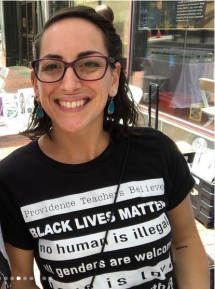Why are we doing this? We always talk about looking at the data and the data is clearly telling you, so why do we still believe that having officers in schools will protect us?
That question was shared by a Providence Teaching for Black Lives study group member during their December discussion of In the Wake of Uvalde a Teacher’s Plea for Police-Free Schools, which appeared in the Fall issue of Rethinking Schools. Study group coordinator Lindsay Paiva framed the conversation of school safety with a quotation from abolitionist Mariame Kaba:

Lindsay Paiva
Study group members realized that many school discipline policies undermine healthy relationships and are rooted in a desire to control students. One participant noted, “Police don’t always come in the form of the uniform. It can be anyone with power.”
In addition to rich conversations, the study group sets aside time each meeting to plan ways to take action. For example, as part of the December meeting, members broke out into small groups to brainstorm ways they might support the coalition of youth groups in Providence, Rhode Island who are spearheading a Counselors Not Cops campaign.
This year the Providence School District officially signed on to the Black Lives Matter at School Week of Action and they are paying teachers to participate in professional development offered by study group members to prepare for the week. This is a result of years of organizing by anti-racist Providence teachers, including those in the study group.
The Providence public school teachers formed a Teaching for Black Lives study group during the 2021–22 school year and are continuing their work this year with eight returning and 14 new members. The group includes K–12 educators in all subjects and meets twice each month.

